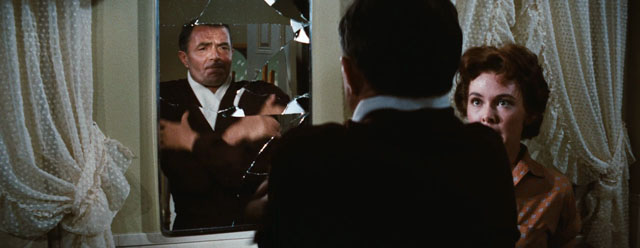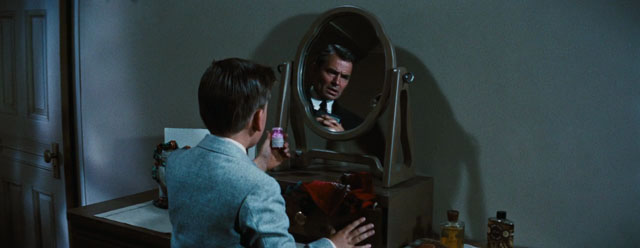I enjoyed the crazily over-the-top performances of Ray’s Rebel Without a Cause and Johnny Guitar but didn’t get much of a sense for his filmmaking – unless his thing was casting unhinged actors and letting them loose within overly melodramatic stories. I suppose he also made extreme/sly comments on society with Johnny’s crusading zealot McCarthy figure and Rebel’s mixed messages on masculinity and family units. Well, this one brings it all together, with an extreme (but less “method”) performance by James Mason and a brutal attack on society and family and everything else. I don’t know if it’s that tying-together of the Ray threads or the movie itself, but I’m currently loving it more than the other two.
Good mirror:

Bad mirror:

Scary mirror:

Mason is a schoolteacher who starts experiencing massive pain. Doctor says the pain will get worse and he’ll be dead in months unless he takes miracle-drug cortisone (wikipedia: “a steroid hormone … suppresses the immune system, thus reducing inflammation and attendant pain”). So Mason pops some pills and all is well – he and loving wife Lou (!) and son Richie carry on with their movie-perfect 50’s lifestyle. But it’s not as perfect as all that… schoolteacher salaries were low even back then, so Mason holds a secret after-school job as a taxi dispatcher in order to keep up those perfect middle-class appearances. The cortisone is expensive, and worse, Mason is forgetful – misses some doses and doubles some others, until he’s taking twice the proper dosage and starting to go completely manic from the side-effects. He quits his cab job, tries to get fired from the school, berates everyone he comes across and finally, in a state of biblical delusion, conspires to kill his son. Last-minute rescue (in the form of a stairway fistfight with buddy Walter Matthau, which alone is worth the price of admission) returns Mason to the hospital, where the doctor straightens out his dosage and brings him back to his senses. Hoorah for modern medicine!
Pain chart:

Walter Matthau!

I guess this was the American Beauty of its time, allowing a white suburban dad to rebel against his status and say things that nice people should not say, attracting the attention of the neighbors, to the horror of his wife. Only this was so much better. The wife (as already contrasted with the wife in Close Encounters) is understanding and recognizably human, there’s a reason given for Mason’s outbursts (drug effects, vs. Spacey’s midlife crisis) and a more reasonable ending (it’s too easy to end your movie by having a sexually-frustrated neighbor shoot your lead character to death).
Good praying:

Bad praying:

One writer worked on three decades’ worth of James Bond movies and the other scripted Forbidden Planet which also came out in ’56 – sounds more like the kind of team that would’ve come up with Star Wars than this. Suppose I’ve seen James Mason in Lolita but he made more of an impression here, with his unexplained foreign accent in the California suburbs, his mad energy shaped (if not subdued) by his British schoolteacher’s intelligence. Barbara Rush (who had appropriately just appeared in a Douglas Sirk movie, as Jane Wyman’s meddling daughter in Magnificent Obsession) was just as good, and it’s always nice to see Walter Matthau, here in one of his first roles.
Cover shot:

Barbara Rush, one more time:
